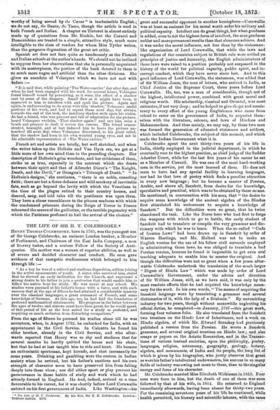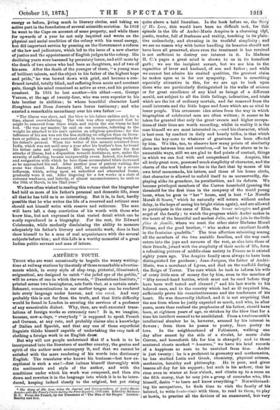of Sir George Colebrooke, an eminent London banker, a Member
of Parliament, and Chairman of the East India Company, a man of literary tastes, and a zealous Fellow of the Society of Anti- -queries. His mother was a woman of superior abilities, as well as of severe and decided character and conduct. He soon gave evidence of that energetic studiousness which belonged to him through life :—
" As a boy he was of a retired and studious disposition, seldom joining in the active amusements of youth. A sister' who survived him, stated that he showed an early inclination for the Church, and expressed a strong desire to his father to join a profession that would enable him to follow his native bent for study. He was never at any schooL His studies were pursued at his father's house with a tutor, and with such success that at the age of fifteen he had attained a considerable mastery -over the classical languages, a great command of French, and some knowledge of German. At this age, too, he had laid the foundation of profound mathematical attainments. His progress in the latter between -the ages of twelve and sixteen must have been great, for he would speak .of this period of life as the best suited for a study so profound, and requiring so much seclusion from disturbing occupations."
From the age of fifteen he pursued his studies alone till he was seventeen, when, in August 1782, he embarked for India, with an -appointment in the Civil Service. In Calcutta he found his elder brother, already in the Civil Service, and who after- wards reported that Henry was so shy and studioug that for several months he hardly quitted the house and his chair, but that he had at last taught him to ride and hunt. He became lin enthusiastic sportsman, kept hounds, and shot incessantly for some years. Drinking and gambling were the custom in Indian society when he arrived, but his father's cautions and his own strength of character seem to have preserved him from falling .deeply into them vices ; nor did either sport or play prevent his #perseverance in those habits of study and work which he had already formed in England. He had, indeed, arrived at a time favourable to his career, for it was shortly before Lord Cornwallis -entered on his first government of India. Like Washington—his • The Life of H. T. Colebrooke. By his Son, Sir T. E. Colebrooke. London: "Trttbner and Co. 1878. great and successful opponent in another hemisphere—Cornwallis was at least as eminent for his moral worth asfor his mi:itary and political capacity. Intellect can do great things, but when goodness is added, even to not the highest form of intellect, the man produces nobler and morepermanent results than that alonecan achieve. And it was under the moral influence, not leas than by the statesman- like organisation of Lord Cornwallis, that while the laws and regulations of the countries subject to British rule were settled on principles of justice and humanity, the English administrators of those laws were raised to a position probably not surpassed inthe history of the world for political capacity, public spirit, and in- corrupt conduct, which they have never since lost. And to this good influence of Lord Cornwallis, the statesman, was added that of Sir William Jones, the man of letters, who arrived in India, as Chief Justice of the Supreme Court, three years before Lord Cornwallis. He, too, was a man of considerable, though not of the highest, intellectual power, combined with great moral and religious worth. His scholarship, classical and Oriental, was most extensive, if not very deep ; and he helped to give shape and consis- tency to every effort of the young Englishmen who came from school-to enter on the government of India, to acquaint them- selves with the literature, science, and laws of Hindoos and Mohammedans. And thus mainly, we may say, by these two men was formed the generation of educated statesmen and soldiers, which included Colebrooke, the subject of this memoir, and which made the Indian Government what it is.
Colebrooke spent the next thirty-two years of his life in India, chiefly employed in the judicial department, in which he eventually rose to the highest position, as chief judge of the Sudder Adawlut Court, while for the last five years of his career he sat as a Member of Council. He was one of the most hard-working men in the service, yet the most learned of them. He does not seem to have had any special facility in learning languages, nor had he that love of poetry which finds a peculiar attraction in every new language ; but he became a master of Persian, Arabic, and above all, Sanskrit, from desire for the knowledge, speculative and practical, which was to be obtained by these means. He mentioned, in conversation with his sons, that "the desire to acquire some knowledge of the ancient algebra of the Hindus first stimulated his endeavours to acquire a knowledge of Sanskrit." But the difficulties were so great, that he twice abandoned the task. Like the Norse hero who bad first to forge the weapons with which to go to battle, the early student of Sanskrit had to translate or compile the very grammar and dic- tionary with which be was to learn. When the so-called "Code of Gentoo Laws" had been drawn up in Sanskrit by order of Warren Hastings, and Mr. Halhed was set to make an English version for the use of his fellow civil servants employed in administering those laws, he was obliged to translate a bad Persian version, because he found it impossible to get even oral teaching adequate to enable him to master the original. And though the difficulties were not so great when a few years after- wards Colebrooke undertook the translation of the much larger "Digest of Hindu Law" which was made by order of Lord Cornwallis's Government, under the advice and direction of Sir William Jones, still, as we have said, it was only by the moat resolute efforts that he had acquired the knowledge neces- sary for the work. In his own words, "The means of acquiring the Sanskrit language were by translating a grammar and several dictionaries of it, with the help of a Brahmin." By unremitting industry for two .years, though without meanwhile neglecting his official duties, he completed—in January, 1797—this great work, farming four volumes folio. He also translated from the Sanskrit two treatises on the Hindc Law of Inheritance, aud a work on Hindu algebra, of which Mr. Edward Strachey Iliad previously published a version from the Persian. Ile wrote a Sanskrit grammar, and several original treatises on Hindu laws, and also essays or papers on the Asiatic Researches, and in tIrgransac- tions of various learned societies, upou the philosop4,, poetry, languages, religion, astronomy, geography, geology, botany, algebra, and monuments, of India and its people, the long list of which is given by hie biographer, who justly observes that great as werehis father's intellectual endowments, his success in so many fields of industry was owing not more to these, than to the singular energy and force of his character.
Mr. Colebrooke married Miss Elizabeth Wilkinson. in 1810. Four sons were born to him, but the death of one of them was soon followed by that of his wife, in 1814. He returned to England immediately afterwards, having been absent for thirty-two years. For the remaining seventeen years of his life he continued, while health permitted, his literary and soientific labours, with the same
energy as before, jiving much in literary circles, and taking an active part in the foundation of several scientific societies. In 1818 he went to the Cape on account of some property, and while there for upwards of a year he not only inquired and wrote on the physical and social condition of the colony with his usual energy, but did important service by pressing on the Government a reform of the law and judicature, which led to the issue of a new charter of justice and the appointment of English judges to the colony. His declining years were harassed by pecuniary losses, and still more by the death of two nieces who had been as daughters, and of two of Isis sons. After the death of the younger of these, "a young man of brilliant talents, and the object to his father of the highest hope and pride," he was bowed down with grief, and became a con- firmed invalid, totally blind, and suffering from acute and constant pain, though his mind remained as active as ever, and his patience constant. In 1834 he lost another—his eldest—son, George Vernon, at the age of twenty-four, who was even superior to his late brother in abilities ; to whose beautiful character Lord Houghton and Dean Jeremie have borne testimony ; and who exerted a remarkable ascendancy over his own father :—
"The illness was short, and the blow to his father sudden and, for a time, almost overwhelming. The wish was often expressed that he might be removed from these trials, and rejoin the son whom he had lost. 'He was my master,' he said on one occasion, referring to the weight he attached to his son's opinion on religious questions ; for the influence of his son was not the less striking on religion than on litera- ture or politics, and it was exercised chiefly in recommending works for his father's perusal. When the writer of this memoir returned from India, which was not until near a year after his brother's loss, he found his father calm and resigned. His temper, which, under the first attacks of illness, had a disposition towards fretfulness, now, under the severity of suffering, became inexpressibly sweet. Indeed, the fortitude and resignation with which he bore these accumulated trials increased as he approached his end. Alter another year of patient waiting, the scene was closed. In January, 1837, he was attacked by a severe influenza, which, acting upon an enfeebled and attenuated frame, gradually wore it out. After lingering for a few weeks in a state of extreme weakness, and latterly, of almost unconsciousness, he sank on the 10th of March, in his 72nd year."
We have of ten wished in reading this volume that the biographer bad told us more of his father's personal and domestic life, since all that he has told us is so interesting. But it is, in fact, hardly possible that he who writes the life of a reserved and reticent man should not himself write with reserve and reticence. The man will have left, a deep conviction of his worth with those who knew him, but not expressed in that varied detail which can be easily reproduced in a biography. For the rest, Sir Edward Colebrooke, while modestly disclaiming the ability to measure adequately his father's literary and scientific work, does in fact show himself to be a man of real acquaintance with the several subjects before him ; and this Life is a worthy memorial of a great Indian public servant and man of letters.



































 Previous page
Previous page